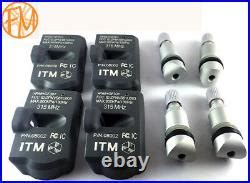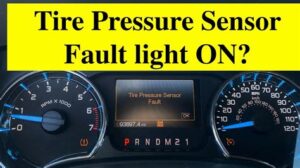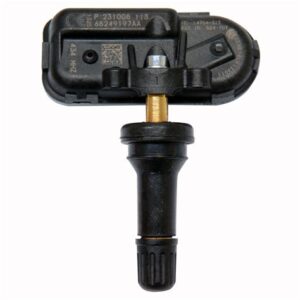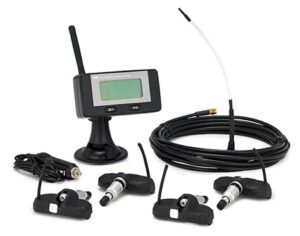Discover the importance of the Mercedes Benz Tire Pressure Sensor, its impact on performance, common signs of issues, and replacement guidelines.When it comes to ensuring the safety and performance of your Mercedes-Benz, maintaining optimal tire pressure is crucial. One key component in this system is the tire pressure sensor, which monitors the air pressure in your tires and alerts you to any deviations from the recommended levels. However, issues can arise if the tire pressure sensor is missing, leading to potential challenges on the road. In this blog post, we will explore the importance of the tire pressure sensor in your Mercedes-Benz, identify common signs that indicate its absence, and discuss how the missing sensor can affect tire performance. Additionally, we’ll highlight the significance of the Tire Pressure Monitoring System (TPMS) and provide guidance on replacing a missing tire pressure sensor to help keep your vehicle in peak condition.
Understanding Mercedes Benz Tire Pressure Sensor
The Tire Pressure Sensor in a Mercedes Benz is a crucial component of the vehicle’s Tire Pressure Monitoring System (TPMS). This sensor is designed to monitor the air pressure within the tires and provide real-time data to the driver. Knowing how the tire pressure sensors work and their importance can help maintain optimal driving conditions and improve safety.
What is a Tire Pressure Sensor?
A Tire Pressure Sensor is an electronic device mounted inside or attached to the tire valve stems. Its primary function is to measure the air pressure in the tires and send this information to the vehicle’s onboard computer. When the pressure falls below a certain predefined threshold, the system alerts the driver through a warning light on the dashboard.
How Does It Function?
- When the tires are inflated to the correct pressure, the sensor sends a normal signal to the TPMS.
- If the air pressure in any tire drops, the sensor detects this change and triggers a warning light.
- Most modern Mercedes Benz vehicles come equipped with either direct or indirect TPMS:
- Direct TPMS: Uses strain-gauge sensors to measure tire pressure directly.
- Indirect TPMS: Monitors wheel speed data and does not directly measure tire pressure.
Importance of the Sensor
Maintaining the correct tire pressure is vital for several reasons:
- Enhanced Safety: Proper tire pressure prevents blowouts and loss of control.
- Fuel Efficiency: Under-inflated tires increase rolling resistance, leading to higher fuel consumption.
- Tire Longevity: Correct pressure prolongs tire life and reduces uneven wear.
- Performance: Properly inflated tires improve overall vehicle handling and stability.
Monitoring your tire pressure regularly contributes to a safer and more efficient driving experience.
Understanding the role and functioning of a Mercedes Benz Tire Pressure Sensor helps you appreciate the technology behind your car’s safety features. Regularly checking and maintaining your sensor ensures optimal performance and longevity of your tires.
Common Signs of Missing Tire Pressure Sensor
When it comes to ensuring the safety and performance of your Mercedes Benz, being aware of the tire pressure sensor is crucial. A missing or malfunctioning tire pressure sensor can lead to various issues, and recognizing the signs early can save you from potential hazards and costly repairs. Here are some common signs that indicate a missing tire pressure sensor:
- Warning Light on Dashboard: The most obvious sign is the TPMS warning light illuminating on your instrument panel. This light indicates that your tire pressure monitoring system has detected an issue.
- Inaccurate Tire Pressure Readings: If you’re frequently checking your tire pressures manually and notice they don’t match the readings from your dashboard, it might be a sign that a sensor is missing.
- Frequent Fluctuations: Unusual or frequent fluctuations in psi without any change to the actual tire conditions can indicate sensor issues.
- Poor Handling: If your Mercedes Benz feels different on the road, with signs of poor handling or stability, this could be a direct result of a problem with the tire pressure sensors.
- Physical Damage to Tires or Sensors: If you’ve had recent tire service or damage, physically inspecting your tires and the attached sensors may reveal if any are missing or damaged.
Being attentive to these signs is essential for maintaining the overall performance of your Mercedes Benz. Addressing a missing tire pressure sensor promptly helps ensure your vehicle operates safely and efficiently.
Impact of Missing Sensor on Tire Performance
The Tire Pressure Sensor is a critical component in modern vehicles, particularly in luxury brands like Mercedes Benz. When this sensor is missing or malfunctioning, it can lead to various issues affecting the overall performance of your tires. Here, we will discuss the significant impacts of a missing tire pressure sensor on tire performance.
1. Tire Pressure Imbalances
Without a functioning sensor, maintaining optimal tire pressure becomes nearly impossible. Most drivers rely on the sensor to alert them when tire pressure falls below the recommended levels. The absence of this sensor can lead to:
- Under-inflation: Tires may lose air pressure over time, causing them to become under-inflated. This leads to increased tire wear and reduces fuel efficiency.
- Over-inflation: Conversely, without the proper alerts, tires may become over-inflated, which can decrease traction and increase the likelihood of a blowout.
2. Poor Handling and Stability
Missing tire pressure sensors can dramatically impact the handling and stability of your Mercedes Benz. Proper tire pressure is essential for maintaining the vehicle’s grip on the road, especially during high-speed maneuvers or adverse weather conditions. Factors affected include:
- Loss of Traction: An incorrect pressure can lead to decreased grip, making it difficult to handle sharp turns and sudden stops.
- Increased Skid Risk: Improperly inflated tires affect the vehicle’s balance, increasing the risk of skidding, particularly on wet or icy roads.
3. Increased Tire Wear
When the tire pressure sensors are missing or defective, the longevity of your tires is jeopardized. Improperly inflated tires tend to wear unevenly, which results in:
- Cupping: This occurs when the tire wears unevenly around the tread, leading to a bumpy ride.
- Reduced Lifespan: Tires that are consistently over or under-inflated can lose their effectiveness much sooner than expected, leading to premature replacements.
4. Effects on Fuel Efficiency
Improper tire pressure not only affects performance but also has a direct impact on fuel efficiency. When tires are not at the correct pressure:
- Increased Rolling Resistance: Under-inflated tires create more drag, causing the engine to work harder and consume more fuel.
- Decreased Mileage: Generally, a tire that isn’t maintained properly will reduce the overall mileage you can achieve with a full tank.
5. Safety Concerns
Last but not least, the absence of a tire pressure sensor poses significant risks to safety. In emergency situations, the performance of your tires can be critical. Poorly maintained tire pressure increases the likelihood of:
- Tire Blowouts: Driving on improperly inflated tires raises the risk of blowouts, particularly at high speeds.
- Accidents: The combination of handling issues and safety risks can lead to severe accidents.
In conclusion, the impact of a missing tire pressure sensor on your Mercedes Benz is profound, affecting everything from tire wear and fuel efficiency to overall safety. Regular maintenance and prompt replacement of missing sensors are crucial to ensure optimal tire performance and safety on the road.
Importance of Tire Pressure Monitoring System (TPMS)
The Tire Pressure Monitoring System (TPMS) is a crucial safety feature in modern vehicles, including those manufactured by Mercedes Benz. It plays a vital role in ensuring that your tires are at optimal inflation levels, which directly impacts vehicle performance, safety, and fuel efficiency. Below are several reasons why TPMS is important:
- Enhanced Safety: Proper tire pressure is essential for maintaining optimal traction and control of your vehicle. A well-functioning TPMS alerts you to any significant drop in tire pressure, helping you avoid potential accidents caused by tire blowouts.
- Fuel Efficiency: Under-inflated tires can lead to increased rolling resistance, resulting in higher fuel consumption. By keeping your tires inflated within the recommended range, the TPMS helps improve your vehicle’s fuel efficiency.
- Tire Longevity: Maintaining the correct tire pressure extends the life of your tires. TPMS assists in identifying when tire pressure is too low or too high, which can lead to uneven wear and reduced lifespan.
- Improved Performance: Tires that are inflated correctly provide better handling and braking performance. A functioning TPMS ensures that you are alerted immediately if tire pressure deviates from the recommended settings.
“An efficient TPMS not only enhances driving performance but also contributes to overall vehicle safety.”
– Automotive Safety Expert
In summary, the Importance of a Tire Pressure Monitoring System (TPMS) cannot be overstated. For Mercedes Benz owners, leveraging this technology is essential for the optimal operation of your vehicle, enhancing both safety and efficiency on the road.
Replacing Missing Tire Pressure Sensor
When it comes to the safety and performance of your Mercedes Benz, the Tire Pressure Sensor plays a vital role. If you’ve discovered that your Tire Pressure Sensor is missing, it’s crucial to take steps to replace it promptly. Here’s a comprehensive guide on how to address this issue.
Why Replace a Missing Tire Pressure Sensor?
A missing tire pressure sensor can lead to various problems, including:
- Inaccurate tire pressure readings
- Increased risk of tire blowouts
- Poor fuel efficiency
- Unpredictable handling issues
Replacing a missing sensor ensures that your Mercedes Benz remains safe and operates at peak performance.
Steps to Replace a Missing Tire Pressure Sensor
- Identify the Sensor Type: Depending on the model, ensure you get the correct sensor compatible with your Mercedes Benz.
- Gather Necessary Tools: You will typically need a jack, a tire iron, a torque wrench, and the new tire pressure sensor.
- Lift the Vehicle: Use the jack to lift your vehicle off the ground, ensuring it is secure.
- Remove the Tire: Unbolt the tire using the tire iron to access the sensor mounted within the tire.
- Install the New Sensor: Fit the new tire pressure sensor into the valve stem and ensure it sits securely.
- Reattach the Tire: Put the tire back on and tighten the bolts with the torque wrench to the manufacturer’s specifications.
- Check for Accuracy: Once installed, reset the Tire Pressure Monitoring System (TPMS) according to the manufacturer’s instructions. Verify that the system accurately detects the new sensor.
Professional Assistance
If you’re unsure about replacing the sensor yourself, it’s advisable to consult a professional mechanic. They will ensure the sensor is correctly fitted and check the overall health of your Tire Pressure Monitoring System.
Maintaining Your Tire Pressure Monitoring System
After replacing the missing sensor, regular checks should be conducted to maintain its effectiveness. Make sure to:
- Monitor tire pressure frequently.
- Inspect the sensor for any signs of damage or wear.
- Keep your tires properly inflated according to manufacturer specifications.
- Regularly service your vehicle to ensure all systems function correctly.
By taking these steps, you will ensure your Mercedes Benz remains safe and performs optimally on the road.
Frequently Asked Questions
What does it mean when the tire pressure sensor is missing in a Mercedes-Benz?
It generally indicates that the tire pressure monitoring system (TPMS) is not functioning correctly, which could lead to inaccurate tire pressure readings.
How can I troubleshoot a missing tire pressure sensor in my Mercedes-Benz?
You can start by checking for any error messages on the dashboard, inspecting the tire pressure sensors for any visible damage, and ensuring that the TPMS is properly calibrated.
What are the consequences of driving with a missing tire pressure sensor?
Driving with a missing or faulty tire pressure sensor can lead to undetected tire pressure issues, increasing the risk of tire blowouts and adversely affecting vehicle safety.
Can I replace a missing tire pressure sensor myself?
While it is possible to replace a tire pressure sensor yourself, it is recommended to consult a professional mechanic for proper installation and calibration to ensure it functions correctly.
What are common reasons for a tire pressure sensor to go missing?
Common reasons include physical damage to the sensor, improper installation during tire changes, or the sensor becoming dislodged due to road conditions.
How much does it typically cost to replace a missing tire pressure sensor in a Mercedes-Benz?
The cost can vary depending on the model and year of the vehicle, but it generally ranges from $50 to $300, including parts and labor.
Is there a way to reset the tire pressure sensor after replacing it?
Yes, after replacing the tire pressure sensor, you may need to reset the TPMS system, which can usually be done by following the instructions in your vehicle’s owner manual or using a diagnostic tool.





